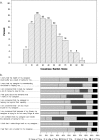Burden on caregivers as perceived by hemodialysis patients in the Frequent Hemodialysis Network (FHN) trials
- PMID: 21421590
- PMCID: PMC3716283
- DOI: 10.1093/ndt/gfr007
Burden on caregivers as perceived by hemodialysis patients in the Frequent Hemodialysis Network (FHN) trials
Abstract
Background: Patients with end-stage renal disease often rely on unpaid caregivers to assist them with their daily living and medical needs. We characterized the degree to which patients enrolled in the Frequent Hemodialysis Network (FHN) trials perceived burden on their unpaid caregivers.
Methods: Participants completed the Cousineau Perceived Burden Scale, a 10-question scale previously developed in hemodialysis (HD) patients. Associations between baseline burden score and prespecified variables were evaluated using multivariable linear regression.
Results: Of 412 participants, 236 (57%) reported having unpaid caregivers. Compared to those without unpaid caregivers, these participants had greater comorbidity (Charlson mean 1.8 ± 1.8 versus 1.2 ± 1.7, P < 0.001), lower Short Form-36 (SF-36) Physical Health Composite (PHC) scores (median 33 versus 41, P < 0.001, higher Beck Depression scores (mean 16 ± 11 versus 12 ± 9, P < 0.001), and worse physical function. Median Cousineau score was 35 (interquartile range 20-53) (theoretical range 0-100). Over 50% felt their caregivers were overextended, yet 60% were confident that their caregivers could handle the demands of caring for them. Higher perceived burden was not associated with ability to be randomized. In adjusted analyses, Cousineau score was inversely associated with SF-36 PHC and Mental Health Composite scores and directly associated with Beck Depression score (each P < 0.001).
Conclusions: Most HD patients in the FHN trials perceived substantial burden on their unpaid caregivers, and self-perceived burden was associated with worse depression and quality of life. Evaluation of the effects of frequent HD on perceived burden borne by caregivers in the FHN trials will help to establish the net benefits/determents of these intensive dialytic strategies.
Figures
Comment in
-
Daily hemodialysis and caregivers burden.Nephrol Dial Transplant. 2011 Jul;26(7):2074-6. doi: 10.1093/ndt/gfr298. Nephrol Dial Transplant. 2011. PMID: 21708982 No abstract available.
Similar articles
-
Effects of frequent hemodialysis on perceived caregiver burden in the Frequent Hemodialysis Network trials.Clin J Am Soc Nephrol. 2014 May;9(5):936-42. doi: 10.2215/CJN.07170713. Epub 2014 Apr 10. Clin J Am Soc Nephrol. 2014. PMID: 24721892 Free PMC article. Clinical Trial.
-
Caregiver burden among nocturnal home hemodialysis patients.Hemodial Int. 2012 Apr;16(2):214-9. doi: 10.1111/j.1542-4758.2011.00657.x. Hemodial Int. 2012. PMID: 22304491
-
Effects of 6-times-weekly versus 3-times-weekly hemodialysis on depressive symptoms and self-reported mental health: Frequent Hemodialysis Network (FHN) Trials.Am J Kidney Dis. 2013 May;61(5):748-58. doi: 10.1053/j.ajkd.2012.11.047. Epub 2013 Jan 15. Am J Kidney Dis. 2013. PMID: 23332990 Free PMC article. Clinical Trial.
-
Intensive Hemodialysis and Health-Related Quality of Life.Am J Kidney Dis. 2016 Nov;68(5S1):S33-S42. doi: 10.1053/j.ajkd.2016.05.023. Am J Kidney Dis. 2016. PMID: 27772641 Review.
-
Intensive Hemodialysis and Potential Risks With Increasing Treatment.Am J Kidney Dis. 2016 Nov;68(5S1):S51-S58. doi: 10.1053/j.ajkd.2016.05.020. Am J Kidney Dis. 2016. PMID: 27772644 Review.
Cited by
-
Safety and efficacy of the Tablo hemodialysis system for in-center and home hemodialysis.Hemodial Int. 2020 Jan;24(1):22-28. doi: 10.1111/hdi.12795. Epub 2019 Nov 7. Hemodial Int. 2020. PMID: 31697042 Free PMC article.
-
Functional Disability in Older Adults Maintained on Peritoneal Dialysis Therapy.Perit Dial Int. 2016 Jan-Feb;36(1):71-8. doi: 10.3747/pdi.2013.00293. Epub 2014 Apr 7. Perit Dial Int. 2016. PMID: 24711642 Free PMC article.
-
Barriers to Home Hemodialysis Across Saskatchewan, Canada: A Cross-Sectional Survey of In-Center Dialysis Patients.Can J Kidney Health Dis. 2020 Aug 10;7:2054358120948293. doi: 10.1177/2054358120948293. eCollection 2020. Can J Kidney Health Dis. 2020. PMID: 32843987 Free PMC article.
-
Effects of frequent hemodialysis on perceived caregiver burden in the Frequent Hemodialysis Network trials.Clin J Am Soc Nephrol. 2014 May;9(5):936-42. doi: 10.2215/CJN.07170713. Epub 2014 Apr 10. Clin J Am Soc Nephrol. 2014. PMID: 24721892 Free PMC article. Clinical Trial.
-
Occupational Priorities of People on Hemodialysis Who Participated in Energy Management Education.Can J Occup Ther. 2025 Jun;92(2):94-101. doi: 10.1177/00084174241271205. Epub 2024 Aug 7. Can J Occup Ther. 2025. PMID: 39113490 Free PMC article. Clinical Trial.
References
-
- Dimkovic N, Aggarwal V, Khan S, et al. Assisted peritoneal dialysis: what is it and who does it involve? Adv Perit Dial. 2009;25:165–170. - PubMed
-
- Tong A, Sainsbury P, Craig JC. Support interventions for caregivers of people with chronic kidney disease: a systematic review. Nephrol Dial Transplant. 2008;23:3960–3965. - PubMed
-
- Klak R, Rymaszewska J, Watorek E, et al. Exhaustion of caregivers of patients on maintenance haemodialysis. Nephrol Dial Transplant. 2008;23:4086. - PubMed
-
- Fan SLS, Sathick I, McKitty K, et al. Quality of life of caregivers and patients on peritoneal dialysis. Nephrol Dial Transplant. 2008;23:1713–1719. - PubMed
Publication types
MeSH terms
Grants and funding
LinkOut - more resources
Full Text Sources
Medical



